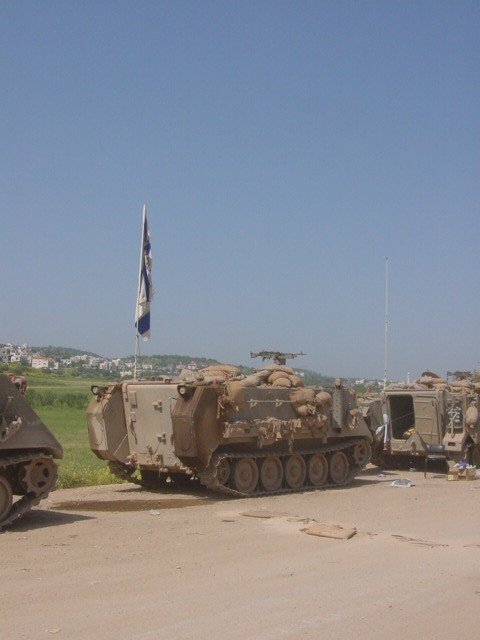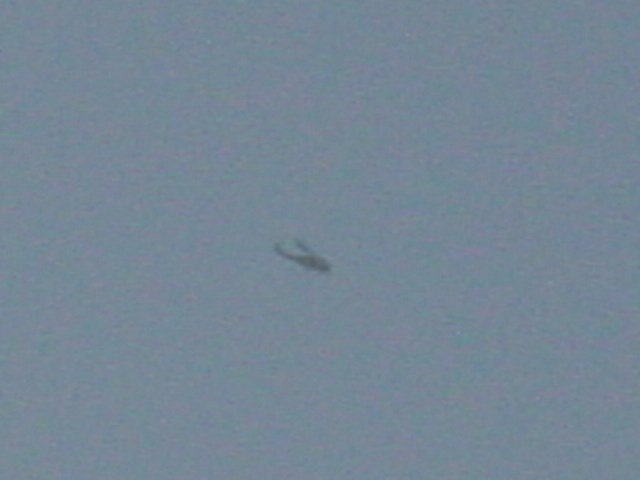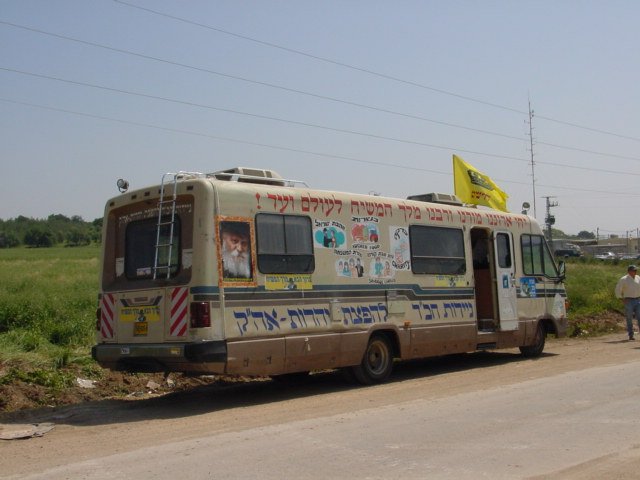April 10, 2002
Our taxi picked us up at 8:30 this morning. Since we were dealing with server problems on our website into the wee hours last night, a later start would've been welcome. Our driver also delivered the news of a suicide bombing in Haifa. It's times like this when you wish your predictions were wrong.
Israeli military vehicles line the road to Jenin.
Israeli helicopters hover over Jenin Camp.
We met up with a couple of journalist friends who were trying to get into Jenin camp (like the rest of the media world) to find out what is really happening. Our plan was to go first by way of Zababdeh so that we could deliver some milk and food to the village then send the media on its merry, dangerous way. The Jalame checkpoint was closed. Very closed - a "Closed Military Zone". Somehow that didn't apply for the handful of settlers commuting across into the West Bank...
This is the first time the two of us have ever been denied entry at Jalame. We had hoped to spend a few hours in Zababdeh, greet people and bring some relief, as well as taking out a few more changes of underwear. No great loss - just frustrating. But seeing the army keep out journalists, knowing what that means, is disturbing. It is, in essence, a press blackout - people have been able to talk by telephone with people inside Jenin, but no one is able to see what's happening, and the military is being very tight-lipped.
We headed into a nearby Arab-Israeli village to see if there was a back road across the Green Line - Muqeible, which has a handful of Christians among their Muslim population, is just three miles from Jenin, but a world away on the other side of the 1948 Cease-Fire line. We found a dozen or so journalists, using a family's roof to get a view of Jenin, all trying to find out what was happening. We could hear heavy machine gun fire and could see and hear the low rumble of Cobra helicopters overhead.
With press denied entry to Jenin Camp, journalists take to the roof of an Arab-Israeli home hoping their zoom lens is strong enough.
We then followed the press feeding frenzy for information - any information - to the village of Salem near Megiddo. Dozens of tanks and armored personnel carriers lined the roads, their movement literally shaking the ground. Again, it was a closed military area, but the journalists found a soldier or two willing to talk. "Sure, it's an effective campaign." "Did you hear about the bomb in Haifa?" "Yeah, but we just need to finish. Then the bombings will stop." What does that mean, "finish?" No one seems to know - there's a lot of rhetoric about "terrorist infrastructure," but the targeting of civil infrastructure, human rights organizations, and medical personnel, as well as the reports of many, many civilian casualties calls all of that into question.
Lubavitchers with messianic fervor celebrating Israeli soldiers as they return from battle.
Then the theologians arrived - a surreal scene if there ever was, a brightly decorated bus pulled up playing music about the Messiah. A couple of Lubovitchers (hard-core Orthodox sectarians) clambered off, eager to hand out "Messiah" flags to soldiers to put on the tanks (since they're doing Messiah work) and "tephilim" to wear on their heads (from Deuteronomy 6), since they protect Jews from the enemy. There was a bizarre carnival atmosphere, with people coming to hand out sweets and coffee to the soldiers. Many were wearing Orange (the Israeli cellphone company) baseball hats - probably part of some giveaway. The hats had "SMILE" written in big orange letters on the front. That was both surreal and disturbing.
We called a friend in Jenin as we stood there in the military staging ground - a nearby parking lot was full of reservists' cars (a "Commuter War" of sorts). Our friend said that women, children, and old people from the Refugee Camp had been told to leave the camp, while men between 15 and 45 were told they must stay. He said that some who left were now wandering around the city trying to find somewhere to take shelter. But it seems that only a small fraction of people left. There's nowhere for these refugees of 1948 to go now.
Within a short time of our arrival, both sides were saying that "the battle" was over. No reports of how many dead, wounded, etc. We also spoke to our dear friends in Nablus. The Anglican compound next to the Old City has been hit hard during the fighting there. Even so, they are staying put and laying low - they can't leave. They finally have electricity, but still no water.
As we left the Salem checkpoint, we ran into a UN convoy headed into Jenin to deliver relief. We followed them, but were turned back at the checkpoint again. We made our way down to Jerusalem, where we will spend the next few days with friends decompressing. But there is still work to do - a journalist with the Oakland Tribune called us tonight, working on a piece on about the situation and relations among Palestinian Muslims and Christians. Not a political piece, per se, but politics enters every topic here.




